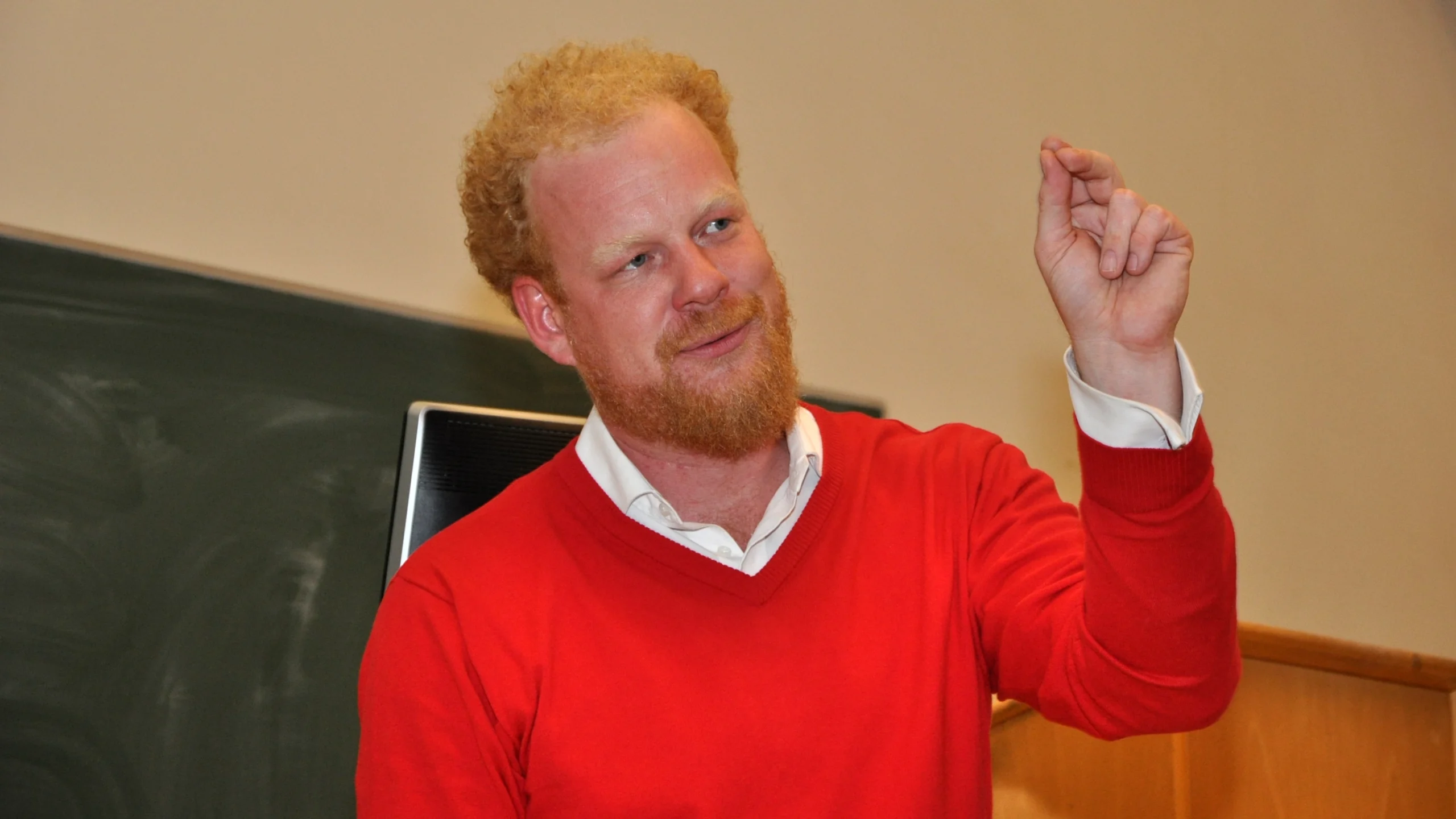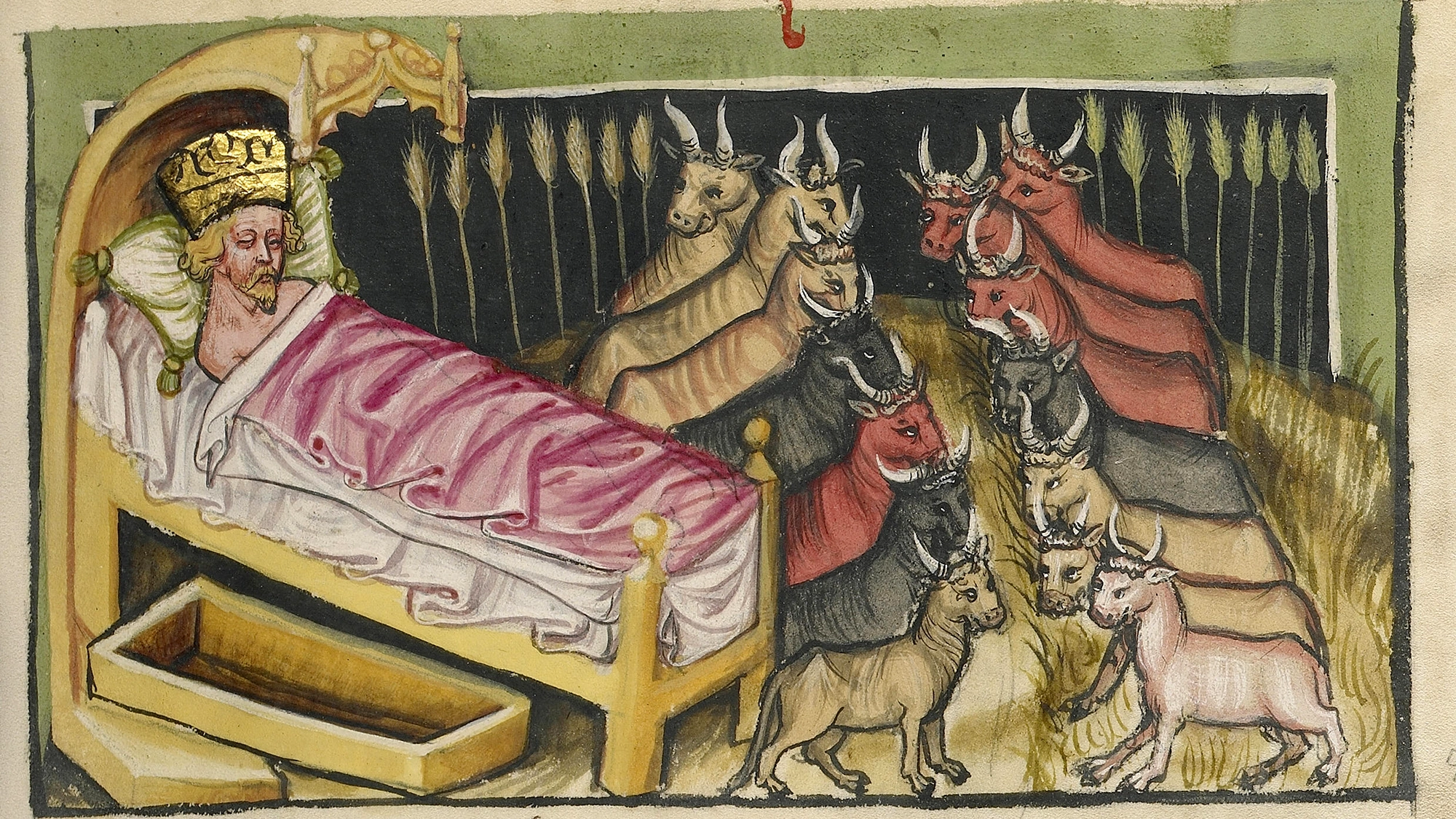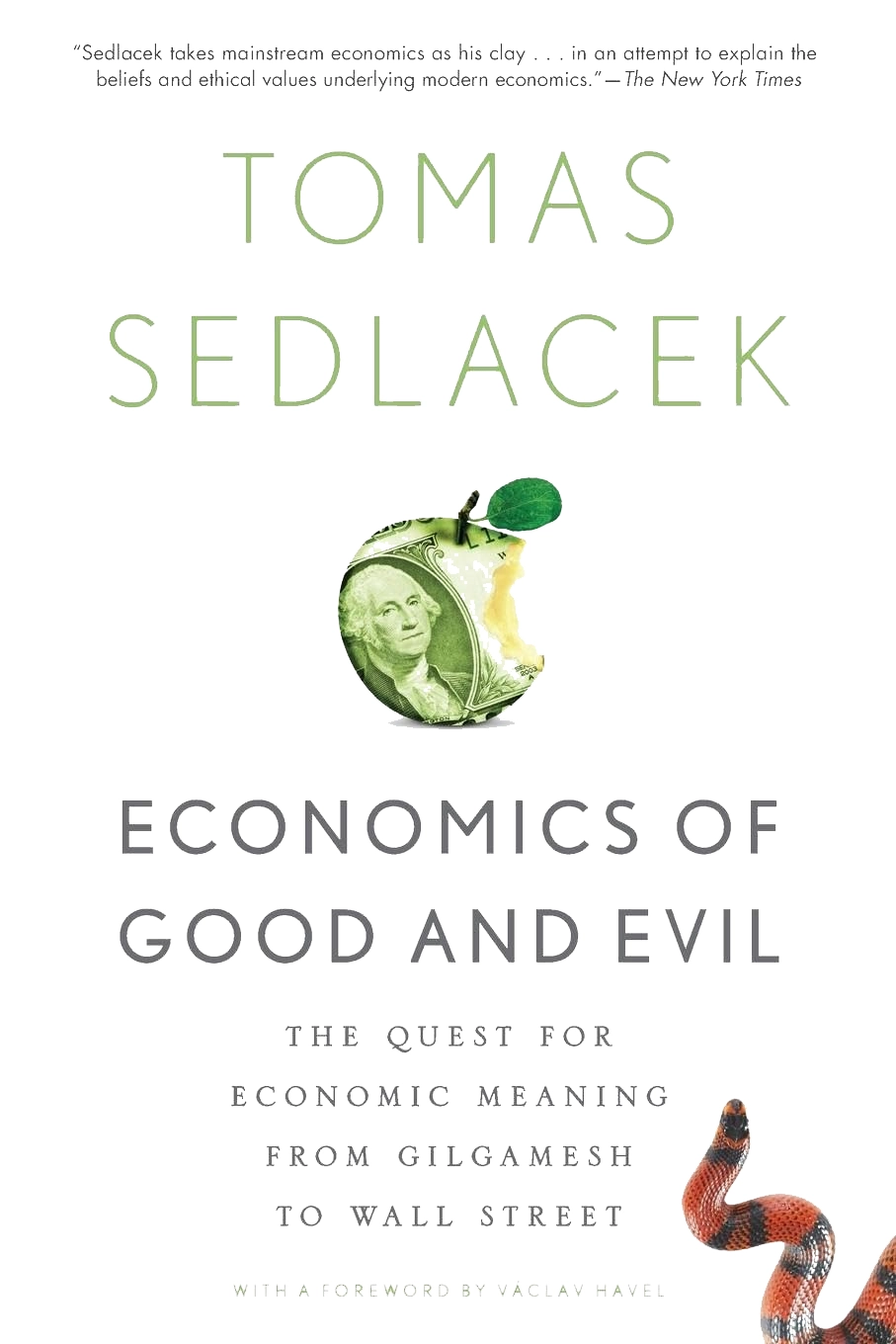 © Markus A. Langer
© Markus A. Langer Forgive Us Our Debts: The Theology Hidden in Modern Economics
Tomáš Sedláček is a renowned Czech economist and author, best known for his book “Economics of Good and Evil,” which explores the philosophical underpinnings of economic thought. He has served as an economic advisor to the Czech president and is a sought-after speaker on topics ranging from economic theory to ethics. In this interview, Sedlacek shares his insights on the current economic landscape, discusses the interplay between economics and morality, and offers his perspective on the future of global markets.
[The interview was conducted in April 2015.]
“Such an economy kills.” Words of Pope Francis. “Today everything falls under the laws of competition and the survival of the fittest.” What is wrong with our economy? Why do you call it a manic-depressive economy?
Tomáš Sedláček: First of all, competition is not specific to economics. We human beings like to compete even in dancing, in skiing, in things that don’t necessarily lend themselves to competition. If you leave three children alone, they will start competing in something. That’s the first point. The second point is about this manic-depressive economy.
Yes, you constantly hear from the news, from the media, and from politicians that the economy is depressed. In my view, that’s a wrong diagnosis. The economy is manic-depressive, if anything. It has a tendency to turn its good periods into manias and its bad periods into depressions. My view is that the manias are just as dangerous as the depressions because, from psychiatry, we know that an organism collapses under both circumstances. We have been focusing on the depressions and haven’t really paid much attention to the manias. And that’s where most of the mistakes were made – during the manic periods.
Is there an alternative right now to this kind of economy, and how can we break out of this cycle?
Tomáš Sedláček: Yes, you can see this wonderfully illustrated in the book of Genesis, actually, chapter 42, with Joseph and Pharaoh. Pharaoh has the macroeconomic prediction of seven good years and seven bad years. The cure is already there in the story, which is more than 3000 years old. The lesson is clear: during the manic periods, do not consume everything that grows during the fertile years, but save it for the bad years.
 © Penta Springs Limited / Alamy Stock Photo
© Penta Springs Limited / Alamy Stock PhotoHowever, we did not follow that advice in the good years before the crisis when there was substantial growth in the Western world. Not only did we consume everything that grew, but we even consumed more, indebting ourselves. We did exactly the opposite of what Joseph advised Pharaoh. Ironically, that ancient Egyptian civilization, according to the story, went through a much more severe crisis – or economic depression, so to speak – or infertile years, and managed to endure seven years of hunger without a single penny of debt. In contrast, we are handling the economy by flooding it with debt.
Since the crisis started, the debate has centered around solving it with even more debt. Yet that supposedly primitive civilization managed to survive a much harsher crisis without accumulating debt. Why? Because they saved. Today, governments don’t save – they accumulate debts. We don’t even have a proper term for a government that saves; we would have to say it has a negative debt-to-GDP ratio. It’s outside our conceptual framework.
So, of course, this system can be cured. In psychoanalysis, when treating a manic-depressive patient – a person suffering from bipolar disorder – mood stabilizers are given. In other words, you reduce the amplitude of the cycle, which is exactly what Joseph did: he took from here and put it there, decreasing the amplitude of the business cycle.
But politically, this is very difficult to do because politicians aim for the highest possible growth. Everyone is focused on that and nobody cares about indebtedness. This creates a huge conflict of interest and a strong temptation for politicians to increase public debt. I believe this is the biggest economic danger of our civilization – that we will grow ourselves into debt and ultimately to death.
Can we sustain solid growth, or will we collapse? Is economic growth truly the solution to all problems?
Tomáš Sedláček: In our modern economic ideology or belief system, we automatically assume that growth is normal and will always be with us. Of course, growth makes many things easier: paying off debt, reducing unemployment, addressing inequality – everything is easier when the sun is shining, so to speak. But living with the assumption that GDP will grow every year is extremely naive. It’s like believing that every day will be sunny.
Naturally, I like sunny days, but expecting every day to be sunny is a recipe for disaster. Similarly, the economy doesn’t grow all the time. Yet, we have built our social system, pension system, healthcare system, and even stock exchanges on the assumption that the economy will grow every year. When this expectation is not met, we feel as if society will collapse. Historically, societies have existed for centuries without significant GDP growth. We didn’t even measure GDP until about 130 years ago.
The problem is not that the economy can’t stand still, but that the system built on top of it – with the naive assumption of constant growth – cannot withstand stagnation. Building a social system on the expectation of endless growth is like designing a ship that can only sail when the wind blows favorably.
What is a good life if growth isn’t the ultimate goal? What is a good life if growth isn’t so great?
Tomáš Sedláček: That’s an excellent question. Why should it be? What more do we want? Almost everyone already has an iPod, a car, and two bikes. What more do we need? It’s like feeding an already full person – it only makes them sick. We have so many areas where we can improve or just enjoy the wealth we already possess. But we are not good at that. We constantly crave things we don’t have instead of being grateful for what we do have. Our prayer should be, “Let me desire the things I have, not the things I don’t have.” Otherwise, living with the belief that every year will be better and better is a recipe for a life full of unmet expectations.
Are you calling for a new regularity?
Tomáš Sedláček: Yes, I’m calling for gratefulness because no civilization on this planet has ever been as rich as ours. Geographically, we live in one of the most beautiful and affluent parts of the world. Yet, paradoxically, we complain more about being poor than people in genuinely poor countries. If an alien were to read our newspapers, they might conclude that we are an impoverished society because we constantly dream of becoming richer. That’s truly strange. Why can’t we just appreciate what we have?
Do we need to reintroduce ethics into the economy, or is ethics already present?
Tomáš Sedláček: The economy has its own ethics – whether they are agreeable or not. One prevalent economic ethic is the idea that egoism is not only acceptable but normal, and that it inevitably leads to common good through the “invisible hand” of the market. This principle claims that private vice becomes public benefit, reversing the biblical concept that good intentions sometimes result in harmful outcomes. Instead, the market ideology assumes that selfish actions will ultimately serve the public good.
What do you mean by “Sabbath economy”?
Tomáš Sedláček: The creation story culminates in rest – not because God was tired, but because the work was done. So the question is: when will we be done? We struggle to find rest, and the only values we respect are those with economic meaning. The Sabbath commandment itself was necessary because human beings have a hard time resting. It had to be a commandment because we are inherently restless. One way to view the crisis is as an enforced rest – a consequence of never taking a break.
What economic ideals come from Christianity?
Tomáš Sedláček: A lot of them, actually. If you look at the parables of Jesus about the Kingdom of Heaven, you’ll find that about two-thirds of them are economic in nature. There’s the parable of the lost coin, the workers in the vineyard, and the story of the talents and interest rates. Jesus frequently uses economic language to convey spiritual lessons.
One of the most fundamental economic ideals from Christianity is the concept of debt forgiveness. In fact, Jesus’ first preaching was essentially about forgiving debts: “I have come to forgive debts.” Interestingly, in many languages – like Greek and German – the word for “sin” and “debt” is the same. This connection between sin and debt points to a deeper economic meaning within Christian teachings.
In biblical times, being in debt often meant becoming a slave to the creditor. There were essentially two ways out: waiting for the “Year of Jubilee” – which occurred every 49 years and served as a kind of sabbatical reset of the economy – or waiting for a “redeemer” who would take on the debt and pay it off. Jesus uses this metaphor to describe his mission: he comes to redeem the indebted, to forgive debts and sins alike.
This idea of debt forgiveness is truly unique to Christianity compared to other belief systems. In the modern context, we often fail to grasp how radical this concept really is. When Greece was in crisis and the question arose whether to forgive its debts, it almost turned into a theological debate: Is Greece a brother nation that we should forgive? How many times should we forgive it – seven times, or seventy-seven times? These numbers were not the point; it was a question of moral and ethical responsibility, reflecting the biblical call to mercy.
How did Thomas Aquinas influence modern economics?
Tomáš Sedláček: Thomas Aquinas was the focus of my first work. The book that later became known as The Economics of Good and Evil actually started with my bachelor’s thesis on Thomas Aquinas, specifically examining his economic thought. From there, I moved one step backward and one step forward each year, structuring the book to explore the progression of economic ideas. I started with Thomas Aquinas, then moved on to Christianity, the Greeks, the Hebrews, and even as far back as The Epic of Gilgamesh. So, Aquinas was a very important thinker for me.
Thomas Aquinas was far more rigorous in his debates than many modern economists are. If you have ever read Summa Theologica or Summa Contra Gentiles, you would know that every question he posed was thoroughly examined from all possible angles. For example, he might ask, “Do angels exist?” and then list 28 strong arguments against their existence. After that, he would consider the opposing view, where the Bible mentions angels, and proceed to systematically refute each of the 28 arguments. This rigorous, comprehensive approach is often missing from contemporary economic discourse.
How did he influence economics? For one thing, he addressed the issue of interest rates, attempting to reconcile their use within a moral framework. One interesting example is his reflection on ownership: Can I possess two shirts if my brother has none? This moral question, rooted in the New Testament, led Aquinas to elaborate on property rights and the ethical implications of wealth. He started from moral principles and ended up developing concepts that we would recognize today as fundamental to economic thought.
This integration of ethics and economics is something modern economics often lacks. Today, we tend to treat economics as a purely technical discipline, detached from moral considerations. Aquinas, on the other hand, never lost sight of the human and moral dimensions, making his approach far richer and more holistic.
Did Christianity create capitalism?
Tomáš Sedláček: That’s a big question — and a much-debated one. Max Weber famously argued that it was the Calvinist Protestant ethic that gave rise to the spirit of capitalism. According to him, the inner-worldly asceticism of Protestantism, especially Calvinism, promoted hard work, discipline, and frugality — values that aligned naturally with the logic of capital accumulation.
But there are other voices. Michael Novak, a Catholic thinker, claimed it was actually Catholic ethics that paved the way for capitalism. Then you have the controversial German economist Werner Sombart, who suggested that the true roots of capitalism lie in Jewish thought, particularly the values and legal frameworks found in the Old Testament.
So, it’s difficult to give a definitive answer. What is clear is that Christian thought had a major influence on the emergence of economic systems in Europe. But we must also acknowledge the profound impact of Greek philosophy — thinkers like Aristotle, for example, who was deeply critical of interest (usury). Many Christian theologians, including Thomas Aquinas, adopted and adapted these classical ideas, blending them with biblical teachings.
In short, the development of capitalism can’t be traced to a single source. It was shaped by a confluence of ideas — Christian, Jewish, Greek — and historical conditions, such as the growth of cities, trade, and legal institutions in the late Middle Ages and early modern period.
Should capitalism be abolished or reformed?
Tomáš Sedláček: Capitalism is one of the few systems that draws energy from its own criticism. If you criticize communism, you weaken or even destroy it. But if you criticize capitalism, you make it stronger. Both capitalism and democracy thrive on feedback, correction, and critique. They are evolutionary systems, constantly adapting.
Take Schumpeter, for example. He called it creative destruction — the idea that capitalism is always reinventing itself by destroying old structures and creating new ones. And that’s true. Capitalism is not static. It has changed drastically over time — and it continues to evolve.
He’s our common economist, by the way. Joseph Schumpeter was born in Moravia, when it was part of the Austro-Hungarian Empire — so he belongs to both of us.
But capitalism cannot simply be abolished — not because it’s perfect, but because we have no viable alternative. Even the most radical leftist thinkers today, like Slavoj Žižek, openly admit that we can’t even imagine a society that isn’t capitalist. And that’s not necessarily a failure of capitalism — it’s a failure of imagination on the part of its critics.
Of course, the system will continue to evolve. It will become more humane — hopefully — but never fully human. Because we, too, are not fully human. We are constantly striving, constantly dissatisfied with who we are, with where we are. Always looking to our phones, our books, our theories — chasing something just out of reach.
In that sense, the economy mirrors us. It reflects our own restless, unfinished nature. Just as we change, so does the economy. Twenty years ago, it looked completely different. Take ecology — today, it’s a major theme. Twenty years ago, it was a fringe issue, barely taken seriously. So I do believe capitalism will continue to evolve — and ideally, into something we feel more comfortable with.
What lessons can we learn from the financial crisis?
Tomáš Sedláček: In the beginning, it was called a “credit crunch.” The word “credit” comes from the Latin “credo,” meaning belief or faith. So it was essentially a faith crunch – a loss of belief in the self-regulating nature of the economy, the rationality of markets, and the idea that banks and markets could guide us into the future. We no longer believe that everything will automatically be set right, but we have not yet found a new guiding principle. It’s as if we are in a transitional period, much like the Catholic Church at the eve of the Protestant Reformation – waiting for a new vision but without a clear leader or reformer to show the way.

Economics of Good and Evil
The Quest for Economic Meaning from Gilgamesh to Wall Street
Tomáš Sedláček
Oxford University Press, 2011
ISBN: 978-0199322183
The book serves as a compelling call for a “meta-economics”—an approach that consciously integrates the historical, cultural, psychological, theological, and philosophical underpinnings of economic thought into its core analysis. It urges economists to move beyond simplified numerical assumptions and embrace the full complexity of human behavior, acknowledging the positive influence of non-egocentric motives that extend beyond narrow self-interest. Ultimately, Sedlacek’s work is a powerful manifesto for “humanomics,” advocating for a return to placing humanity, with all its stories and philosophies, at the very core of economic inquiry.
